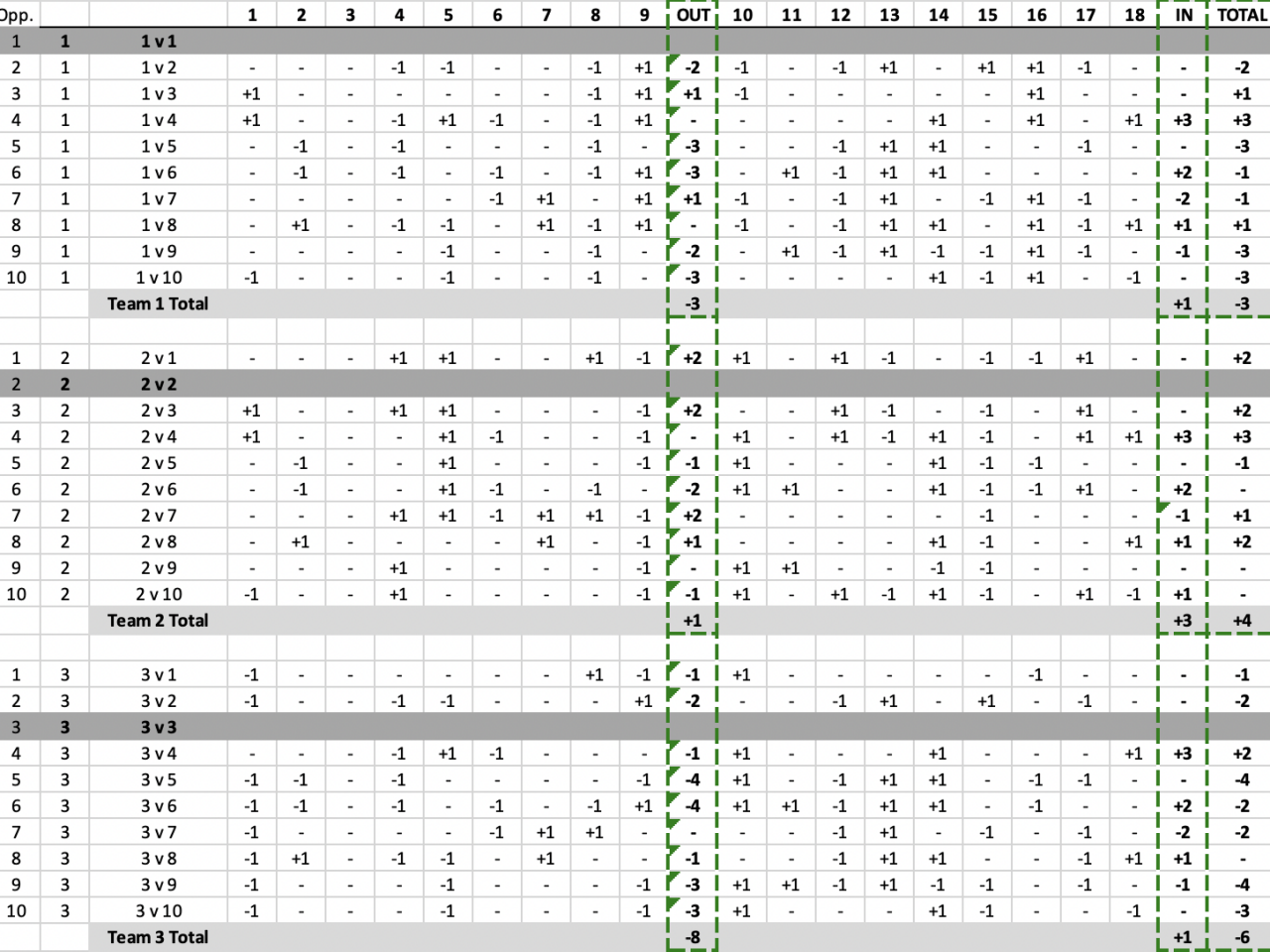Swat golf betting game

It's like starting a clean slate in a round of golf betting, where neither you nor your buddy is in the lead, and the game is as level as the. When it comes to golf betting, sportsbooks will allow you to bet on if a player finishes in the Top 5, Top 10, Top 40 and so on. The meaning of the term. What does the term "to make cut" mean in the world of golf betting? Otherwise, if you think that he will not be playing his best game, you'd want to take the. It's been nine years since police in Fairfax County, Va., turned small-time bettor Sal Culosi swat golf betting game a bookie and then killed him.
Swat Tournament
Josh Taylor v Jack Catterall 2. Khamzat Chimaev vs Sean Strickland. Anthony Joshua v Deontay Wilder. Jon Jones vs Stipe Miocic. KSI v Jake Paul. Conor McGregor vs Michael Chandler. Miami Grand Prix. Apostas UFC Apuestas para Canelo Alvarez vs. Apostas Esportivas Online Apostas em artes marciais mistas - Onde apostar no MMA. Como abrir uma conta de apostas esportivas. Bet Bonus Code.
Baseball Basketball Boxing Football Golf MMA Other Soccer Tennis Definition of To Make Cut What does the term "to make cut" mean in the world of golf betting. What is meant by the term "to make cut". The "to make cut" line is very simple - you are simply betting on if a player will "make the cut" in a tournament or not.
Tournaments will usually utilize a "cut" that is meant to thin the tournament out after 36 holes of play. This makes it easier for tournament organizers to avoid issues with darkness, etc. For instance, the Masters will "cut" down to around 50 players after 36 holes of play. Swat golf betting game With the "to make cut" line, you are betting on if a player will make the cut or not.
Otherwise, if you think that he will not be playing his best game, you'd want to take the "no" side. Tools Betting Odds Conversion. October Baixinho. The result is that the hole is played and scored as if the first errant shot had never been made. This practice is disallowed entirely by strict rules in formal play and players who attempt it or agree to let it happen may be disqualified from sanctioned competitions.
A "gilligan", the opposite of a "mulligan", is to redo a successful stroke when so requested by an opponent. As mulligans are not covered by strict rules — except to prohibit them — there are many variations of the practice among groups of players who do allow them in friendly games.
If a mulligan is allowed to be used to replay any shot, typically each player is limited to 18 per round, sometimes 9 in the first 9 holes and 9 in the second nine. In the case of a mulligan used to replay the first tee shot, multiple "mulligans" may be allowed under different names Finnegan, Branagan, Flanagan, or Craig until the player has hit a playable tee shot.
Although certain players may wish to bank their shots, this is deemed unsportsmanlike and is generally frowned upon. Golf tournaments held for charity may charge for mulligans to collect more money for the charity. In Titan , the rules of the version allow a "First move mulligan" for an unfortunate dice roll.
In collectible card games, a mulligan refers to the process of adjusting which cards are in a player's initial hand of cards. Card games have various official rules for how mulligans are performed.  In Magic: The Gathering , a player may declare a mulligan after drawing their initial hand at the beginning of each game.
In Magic: The Gathering , a player may declare a mulligan after drawing their initial hand at the beginning of each game.
If a player chooses to do so, that player shuffles their current hand back into their deck, draws a new hand of seven cards, then puts one card on the bottom of their library for each time they've mulliganed this game. The player may repeat this until satisfied, or until the number of cards in their hand reaches zero.
The mulligan process has changed drastically over the history of the game. The current style is known as the London mulligan , as it was first used at a Mythic Championship tournament held in London. Hearthstone allows players to mulligan at the start of the game by placing any number of cards in their opening hand back into their deck, each to be replaced with a random different card.
Mulliganing one's entire hand in hopes of getting a specific card is referred to as a hard mulligan. If both players must mulligan, each of them reveals their hand, shuffles it into their deck and draws seven cards. If only one player must mulligan, their opponent may draw a number of cards up to the number of mulligans they took. They may return any number of cards into their deck and shuffle it, then draw the same number of cards.
Ashes: Rise of the Phoenixborn bypasses mulligan rules common to other card games, and instead has a "First Five" rule, allowing players to pick the specific five cards which will comprise their opening hand. In KeyForge , a player who is dissatisfied with their starting hand may discard it and draw a new hand with one fewer card.
In Legends of Runeterra , a player who is dissatisfied with their hand may shuffle any number of cards back into their deck, and draw the same number of cards. In Gwent: The Witcher Card Game , players can mulligan up to two cards at the start of each round, replacing it with a random card from their deck. The player who goes first in Round 1 gets an additional mulligan. Also, as players draw three cards at the beginning of a round, but cannot have more than ten cards in hand, each drawn card that would increase their hand size over ten becomes a bonus mulligan instead.
In knock-out whist an eliminated player may ask for a "dog's chance" in the next round. That player is then dealt a single card regardless of how may cards would normally be in that hand. If the player succeeds in winning a trick with that card, they stay in for the next round, otherwise they are eliminated again. In politics , the term mulligan race or mulligan candidate is used to describe a losing or disqualified candidate in a party primary or nomination, who, nevertheless, runs in the general election on another ballot line, either as an independent or as the nominee for a third party.
In the Connecticut U. Senate race, many Ned Lamont supporters accused Senator Joseph Lieberman of running a mulligan race as an independent, since he had lost the Democratic Party primary. Several U. As a general rule, in liberal democracies outside the United States there are few if any laws that would prevent failed or disqualified nomination candidates from contesting the general election, although mounting such a challenge often results in expulsion or permanent ostracization from the candidate's former party.
In jurisdictions using the Westminster system or single-member districts , mulligan candidates are a fairly common occurrence, especially in cases where the mulligan candidate alleges a nomination contest was lost due to unfair electoral practices or was disqualified by a former party without reasonable cause.
Related terms include mulligan leader and mulligan party , the latter of which is used to describe a party founded or taken over by a failed leadership candidate or deposed former leader from another party. A recent example of such a party is the People's Party of Canada , founded by failed Conservative Party of Canada leadership candidate, Maxime Bernier , while a notable historical party from the same country was the provincial Newfoundland Reform Liberal Party , founded and led by former Newfoundland and Labrador Premier Joey Smallwood.
Although such parties rarely become serious contenders to form a government in general elections, if popular enough, they can cause vote splitting that especially in first past the post voting systems, may severely damage the electoral prospects of the mulligan leader's former party. In the American Democratic primary elections , the term mulligan was used to describe a proposed redo of elections in Michigan and Florida , after their results were declared invalid due to the early scheduling of the contests, against Democratic party rules.
The term also is coming into use to describe situations that are becoming increasingly common in the age of social media where a political party's candidate or delegate is suddenly replaced by the party leadership on the eve of an election or convention, usually either because the person's loyalty to the party or its leaders have come into question or because unsavory details regarding his past or character surface that warrant drastic measures to mitigate damage to the reputation or electoral prospects of the party or its leadership.
Electoral rules and laws mostly drafted prior to the advent of social media, often severely restrict or prohibit the replacement of candidates after the nomination period has closed, which might be weeks or even months prior to the final vote. Proposals to relax such rules to allow parties to deal with to the increased likelihood of a candidate's dodgy past coming to light at an inopportune moment have been mocked as mulligan rules by critics.
In finance , the term is used to refer to provisions in syndicated loan documentation where lenders only get the right to accelerate their loans after two financial covenants are breached. This practice is rare today, but was popular with sponsors at the height of the credit boom in , allowing them to postpone the date at which they needed to start negotiating a restructuring with lenders.
The loan "mulligan" is to be contrasted with a "deemed cure" clause that would allow a covenant breach to be disregarded in the event the next covenant tests were met. In addition, it typically remains possible with loans carrying financial covenants for a borrower to "cure" covenant breaches after the event by injecting new cash equity.
Contents move to sidebar hide. Article Talk.
Popular Pages
- Golf betting tips this week
- Bar one racing golf betting
- Masters field and odds
- Sony open first round leader picks
- Usa golf betting
- Lpga odds this week
- Man 6874 fau beta golf
- Wgc leaderboard 2023
- Golf betting games bingo bango bongo
- Rbc heritage golf betting
- Golf skins betting
- Odds for golf tournament
- Video dan beto snow golf round
- Golf betting stats
- The match betting odds